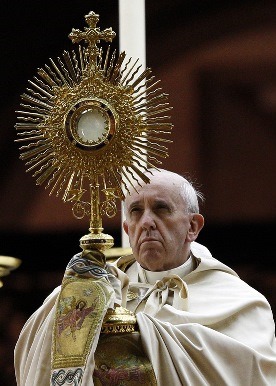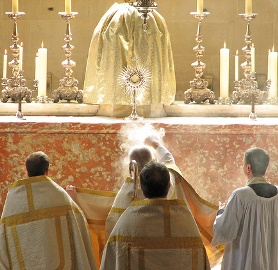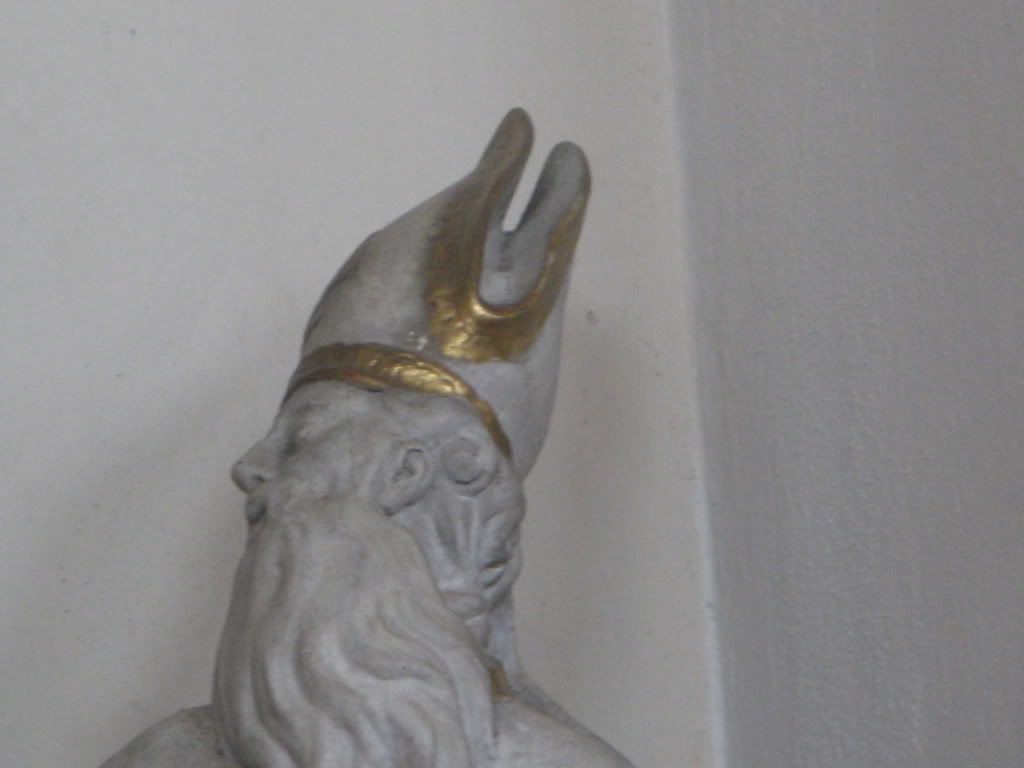Pope Francis holding above his head the Catholic monstrance which contains the eucharist that is worshiped. The disc exactly the same as the sun god worshiped

Priests offering incense to their biscuit enclosed by sun-god emblem

Pagan Sun God

Posted on 12/14/2014 11:57:21 AM PST by ealgeone
The reason for this article is to determine if the worship/veneration given to Mary by the catholic church is justified from a Biblical perspective. This will be evaluated using the Biblical standard and not man’s standard.
the sentence in your tag line ends with a preposition...that is a no-no.Do you suppose that terycarl wants us to correct all of his grammar and punctuation errors? That will fill up the thread real fast with BUMPS!Now that's FUNNY!!!!!!!!
It seems we're busy enough just correcting his faulty interpretations of scripture.
Pope Francis holding above his head the Catholic monstrance which contains the eucharist that is worshiped. The disc exactly the same as the sun god worshiped

Priests offering incense to their biscuit enclosed by sun-god emblem

Pagan Sun God

The very best there is.
John 16:13 "But when He, the Spirit of truth, comes, He will guide you into all the truth; for He will not speak on His own initiative, but whatever He hears, He will speak; and He will disclose to you what is to come.
1 John 2:27 As for you, the anointing which you received from Him abides in you, and you have no need for anyone to teach you; but as His anointing teaches you about all things, and is true and is not a lie, and just as it has taught you, you abide in Him.

Well, it applies to both earthly and spiritual affairs, and in order to refute the fallacious presumed power then it is necessary to contrast it with what is Scriptural, and indeed it is a contrast.
For besides presuming perpetual assured infallibility, rather than being instruments to the Holy Spirit executing actions thru obedient servants, based upon autocratic Romish claims, some RCs imagine God awaits orders from "priests" to which He is bound to obey.
With regard to the mystic body of Christ, that is, all the faithful, the priest has the power of the keys, or the power of delivering sinners from hell, of making them worthy of paradise, and of changing them from the slaves of Satan into the children of God. And God himself is obliged to abide by the judgment of his priests, and either not to pardon or to pardon..The sentence of the priest precedes, and God subscribes to it. .” – Dignity and Duties of the Priest, St. Alphonsus Ligouri, Vol. 12, p. 2 (whose writings were declared free from anything meriting censure by Pope Gregory XVL (1839) in the bull of his canonization). http://www.archive.org/stream/alphonsusworks12liguuoft/alphonsusworks12liguuoft_djvu.txt
The supreme power of the priestly office is the power of consecrating...Indeed, it is equal to that of Jesus Christ...When the priest pronounces the tremendous words of consecration, he reaches up into the heavens, brings Christ down from His throne, and places Him upon our altar to be offered up again as the Victim for the sins of man...Indeed it is greater even than the power of the Virgin Mary [who is said to be all but almighty herself]...The priest speaks and lo! Christ, the eternal and omnipotent God, bows his head in humble obedience to the priest's command. - (John A. O'Brien, Ph.D., LL.D., The Faith of Millions, 255-256 , O'Brien. Nihtt obstat: Rev. Lawrence Gollner, Censor Librorum Imprimatur: Leo A. Pursley, Bishop of Fort Wayne,-South Bend, March 16, 1974
Key word "assumed."
All "Mary" "assumptions" are just that...assumptions.
So which Mary is the center of the Catholic belief system now??
This is getting more cornfuzing all the time!
"For he that eateth and drinketh unworthily, eateth and drinketh damnation to himself, not discerning the Lord's body. For this cause many are weak and sickly among you, and many sleep [die]."
--St. Paul
"They abstain from the Eucharist and from prayer, because they confess not the Eucharist to be the flesh of our Saviour Jesus Christ, which suffered for our sins, and which the Father, of His goodness, raised up again. Those, therefore, who speak against this gift of God, incur death in the midst of their disputes. "
--St. Ignatius (110 A.D.)
+++
FWIW, the golden rays which radiate from the Body and Blood of Christ, reserved in the monstrance, symbolize the "Light of the World."
You can learn about the historical development of monstrances here.
Makes Jesus a pawn of “Priests”
Hard camel to swallow...


Yup.
Where would Jesus be without His mother?
The question really is where did Rome come up with these pagan emblems they incorporated into their worship???
Of course catholics are instructed on what the Ministerium says they are, that does not mean that is what they are.
I do not believe Jesus intended the wine and bread to “be” his actual body and blood. That is catholic doctrine not Christian. For this was done at the last supper and HE was not yet crucified...
Catholics worship the “emblems” established by the church...and this in order to give the people a “feeling” and “sence that they are doing an act of worship...when in fact it is very self centered...and is certainly not the blood now the actual body mysteriously changed by a catholic representative, and certainly not of the biblical Christ we serve and worship.
Indeed, for while RCs only see "this is my body" out of which they contrive a form of endocannibalism, as i have often shown before by God's grace, what the context of 1 Cor. 11:19-34, most clearly teaches is that believers are to effectually recognize that the church is the body of Christ
And which is to show (declare, proclaim) the Lord's death by how they take part in the communal "feast of charity," (cf. Jude. 1:12) showing their unity with Him and each other with unselfish love, which Christ supremely showed in purchasing the church with His sinless shed blood. (cf. Acts 20:28)
Thus the sin of some was not effectually recognizing others as part of that body for whom Christ died, but going ahead and selfishly eating independent of others, even shaming them that have not. Thus the nature of the elements was not the focus, but it was that of the corporate body of Christ, which is also the focus in the proceeding chapter 12, and which was the reason why Paul also said "I will eat no flesh while the world standeth, lest I make my brother to offend." (1Co. 8:13)
Moreover, instead of dispensing bread as part of their ordained function, the primary work of NT pastors is prayer and preaching, (Acts 6:3,4) to "Preach the word; be instant in season, out of season; reprove, rebuke, exhort with all longsuffering and doctrine." (2 Timothy 4:2)
And which is what is said to "nourish" the souls of believers, and believing it is how the lost obtain life in themselves. (1 Timothy 4:6; Psalms 19:7;Acts 15:7-9)
Thanks be to God. Thus formally identifying a distinctive class of Christian clergy as “priests” rather than “presbyters” (elders) is not only grammatically incorrect by it is functionally unwarranted and unscriptural.
Even the Catholic NAB notes states concerning v. 28 states:
The self-testing required for proper eating involves discerning the body (1 Cor 11:29), which, from the context, must mean understanding the sense of Jesus’ death (1 Cor 11:26), perceiving the imperative to unity that follows from the fact that Jesus gives himself to all and requires us to repeat his sacrifice in the same spirit (1 Cor 11:18–25). - http://usccb.org/bible/1corinthians/11
Posts 3315 and 3317 were intended for you but I mistakenly addressed them to myself via small text cell phone.
Thank you. Your comment exemplifies exactly what the term sola fide means and meant to the Reformers. We are saved by faith alone but not by a faith that is alone, is how the confession explains it and it shows that James compliments Paul - and as both were from the Holy Spirit, we know that they would.
I find it interesting how Roman Catholics constantly attack the central Reformation doctrine of justification by faith alone by making their appeal to the "historical" church and what was taught from the start, as if the Roman model was how it always has been. In reading several sites, I see that this is not something that they can back up with the writings of the earliest church "fathers". In Allister McGrath's work, Iustitia Dei: A History of the Christian Doctrine of Justification, he states:
“The history of early Christian doctrine is basically the history of the emergence of the Christological and Trinitarian dogmas. Whilst the importance of soteriological considerations, both in the motivation of the development of early Christian doctrine and as a normative principle during the course of that development, is generally conceded, it is equally evident that the early Christian writers did not choose to express their soteriological convictions in terms of the concept of justification. This is not to say that the fathers avoid the term 'justification': their interest in the concept is, however, minimal, and the term generally occurs in their writings as a direct citation from, or a recognisable allusion to, the epistles of Paul, generally employed for some purpose other than a discussion of the concept of justification itself. Furthermore, the few occasions upon which a specific discussion of justification can be found generally involve no interpretation of the matter other than a mere paraphrase of a Pauline statement. Justification was simply not a theological issue in the pre-Augustinian tradition. The emerging patristic understanding of matters such as predestination, grace and free will is somewhat confused, and would remain so until controversy forced a full discussion of the issue upon the church. Indeed, by the end of the fourth century, the Greek fathers had formulated a teaching on human free will based upon philosophical rather than biblical foundations. Standing in the great Platonic tradition, heavily influenced by Philo, and reacting against the fatalisms of their day, they taught that man was utterly free in his choice of good or evil. It is with the Latin fathers that we observe the beginnings of speculation on the nature of original sin and corruption, and the implications which this may have for man's moral faculties.
'It has always been a puzzling fact that Paul meant so relatively little for the thinking of the church during the first 350 years of its history. To be sure, he is honored and quoted, but - in the theological perspective of the west - it seems that Paul's great insight into justification by faith was forgotten.'” Source:Alister McGrath, Iustitia Dei: A History of the Christian Doctrine of Justification (New York: Cambridge University Press, 2000), 19.
In Jaraslov Pelikan’s book, Obedient Rebels: Catholic Substance and Protestant Principle in Luther’s Reformation, he states:
“Existing side by side in pre-Reformation theology were several ways of interpreting the righteousness of God and the act of justification. They ranged from strongly moralistic views that seemed to equate justification with moral renewal to ultra-forensic views, which saw justification as a 'nude imputation' that seemed possible apart from Christ, by an arbitrary decree of God. Between these extremes were many combinations; and though certain views predominated in late nominalism, it is not possible even there to speak of a single doctrine of justification.”
He said in The Riddle of Roman Catholicism:
All the more tragic, therefore, was the Roman reaction on the front which was most important to the reformers, the message and teaching of the church. This had to be reformed according to the word of God; unless it was, no moral improvement would be able to alter the basic problem. Rome’s reactions were the doctrinal decrees of the Council of Trent and the Roman Catechism based upon those decrees. In these decrees, the Council of Trent selected and elevated to official status the notion of justification by faith plus works, which was only one of the doctrines of justification in the medieval theologians and ancient fathers. When the reformers attacked this notion in the name of the doctrine of justification by faith alone—a doctrine also attested to by some medieval theologians and ancient fathers—Rome reacted by canonizing one trend in preference to all the others. What had previously been permitted (justification by faith and works), now became required. What had previously been permitted also (justification by faith alone), now became forbidden. In condemning the Protestant Reformation, the Council of Trent condemned part of its own catholic tradition." (Jaroslav Pelikan, The Riddle of Roman Catholicism (New York: Abingdon Press, 1959), pp. 51-52)
WRT the RC polemicists' condemnation of Luther on his translation of Roman 3:38 and the words "faith alone":
As the editors of Luther’s Works point out, “[Luther] never intended to say that true faith is, or ever could be—much less should be—without good works. His point was not that faith is ever “alone,” but that “only” faith without works—hence the term “faith alone”—is necessary for justification before God"[LW 35:195, footnote 63; See also my paper, *Did Luther Say: Be A Sinner And Sin Boldly?* ]. The justifying faith that Luther spoke of was a living faith. “Faith,” wrote Luther, “is a living, restless thing. It cannot be inoperative. We are not saved by works; but if there be no works, there must be something amiss with faith.” Luther says, “Accordingly, if good works do not follow, it is certain that this faith in Christ does not dwell in our heart, but dead faith…” http://beggarsallreformation.blogspot.com/2006/07/response-to-catholic-apologist-bob.html
Regarding Ignatius....
Why would I even remotely believe what he would say when he clearly saw himself a mystic given to visions of Mary, often flagellating and cutting himself.. further the Jesuits history of moral depravity and their numerous crimes against humanity should certainly give pause to consider any manner of what he would say, regardless of the pillar catholics set him on.
“Loyola had made the Virgin the most important thing in his life.... The Worship of Mary was the base of his religious devotions and was handed down by him to his Order..... This worship developed so much that it was often said, and with good reason, that it was the Jesuits’ real religion’ “
[the quote inside the quote is by “Father” Charmot, a Catholic, not a Protestant] (”The Secret History of the Jesuits: Paris, 59).
“To beat or flagellate ourselves, and offer each blow as a sacrifice to God through Mary, to carve with a knife the holy name of Mary on our chest: to cover ourselves decently at night so as not to offend the chaste gaze of Mary; to tell the Virgin you would be willing to offer her your place in heaven if she didn’t have her own; to wish you had never been born or go to hell if Mary had not been born; to never eat an apple, as Mary had been kept from the mistake of tasting of it” (”The Secret History of the Jesuits”, Paris, 61).
These degenerate “exercises” and forms of worship were cultivated into licentious and sensual expressions in many Jesuits, some of which are too obscene to mention. One hymn dedicated to the Virgin by Jesuit Jacques Pontanus stated: “...He [Jacques] knew of nothing more beautiful than Mary’s breasts, nothing sweeter than her milk and nothing more delightful than her abdomen”
(”The Secret History of the Jesuits”, Paris, 60).
I’m starting to wonder if catholics can’t find a body they presume it’s been assumed?
Funny, don't recall any mention of these "montrances" in the early church.
Thus the sin of some was not effectually recognizing others as part of that body for whom Christ died, but going ahead and selfishly eating independent of others, even shaming them that have not.And isn't that what many Catholics do to the Christians here?
And even in post #3398 above, even calling for the deaths of those that deny the worshiping of the "Host" purported to actually BE Jesus Christ. (Blaspheme unto itself)
"They abstain from the Eucharist and from prayer, because they confess not the Eucharist to be the flesh of our Saviour Jesus Christ, which suffered for our sins, and which the Father, of His goodness, raised up again. Those, therefore, who speak against this gift of God, incur death in the midst of their disputes. " --St. Ignatius (110 A.D.)
Me: >so makes you wonder what it looks like when they do worship ...<
You Something like below.
And in your picture they are kneeling down.
So you are admitting being on your knees before someone is worshipping them. Throw in prayer and it definitely becomes worship.
This brings us back to the beginning of this thread with how the NT defines worship.
4352 proskynéō (from 4314 /prós, "towards" and kyneo, "to kiss") – properly, to kiss the ground when prostrating before a superior; to worship, ready "to fall down/prostrate oneself to adore on one's knees" (DNTT); to "do obeisance" (BAGD).; suggests the willingness to make all necessary physical gestures of obeisance.]
There’s a great deal within the catholic religion which incorproated whatever symbolism and relics, and false teachings needed to keep the revenues flowing......Purgatory is one of them as are many more.
Unfortunately the indoctrination begins in childhold for most and like a cult often requires a great deal of time to voercome and remove ones-self from those teachings.....coming to Christ as their one and only savior certainly is key.
Disclaimer: Opinions posted on Free Republic are those of the individual posters and do not necessarily represent the opinion of Free Republic or its management. All materials posted herein are protected by copyright law and the exemption for fair use of copyrighted works.